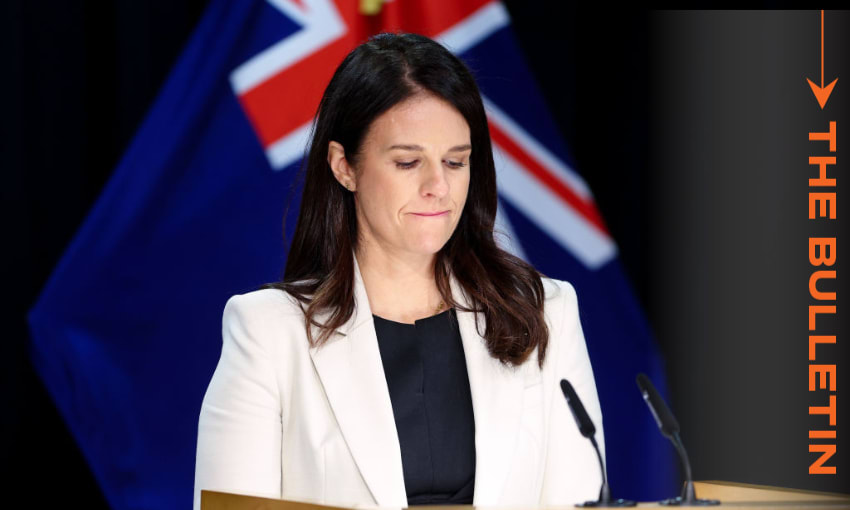A national apology and what's left unsaid
Government agency and political leaders will apologise today for decades of historic abuse in state care.
Mōrena, and welcome to The Bulletin for Tuesday, November 12. Today’s edition is written by Duncan Greive.
In today’s edition: The hīkoi protesting the Treaty Principles Bill is on its way and medicines to treat ADHD have been made more accessible. But first – a preview of today’s historic apology for abuse in state care.

The plan for the day – and who won’t be there
An overdue and much-anticipated apology for abuse in care will occur at parliament, along with concurrent events in Manukau and Christchurch, with up to 1,200 survivors of such abuse expected to attend from around the country – the culmination of an inquiry which detailed abuse of unimaginable severity and scale.
The formal parliamentary ceremony will commence with a mihi whakatau, before testimony from survivors and apologies from government agency leaders. Prime minister Chris Luxon will deliver the national apology at 11.30am, followed by a statement from Labour leader Chris Hipkins – an acknowledgement that both the inquiry and the abuse spanned multiple governments.
Following the national apology, the government will introduce the Responding to Abuse in Care Legislation Amendment Bill to parliament. The Bill will:
Remove strip searches of children in care and provide new search powers for people visiting youth justice facilities.
Strengthen restrictions for people working with young children.
Enforce better record keeping by Government agencies.
Amend the Crimes Act to include disability in the definition of vulnerable adult.
Not all survivors who attend will be part of the ceremony – a number will be protesting outside parliament, with Stuff reporting on Mike Ledingham, who typifies many critics who charge that the lack of a defined position on compensation renders the ceremony “hollow”. This is echoed by the Greens’ spokesperson for children, Kahurangi Carter, who said in a statement that “an apology without accountability – or worse, actively perpetuating the same harms – is nothing more than empty air.”
A national stain, acknowledged
The Abuse in Care Inquiry was announced in December of 2017, not long after the election of the Jacinda Ardern-led coalition and just days before a similar Royal Commission delivered its final report in Australia (showing how lagging we were in such a reckoning). Our commission reaches a sombre milestone today, with the formal apology to victims of that abuse, corralled by Erica Stanford, the minister in charge of responding to July’s enormous, 3,000 page report.
It detailed the vast scale of abuse at state and faith-based institutions in New Zealand between 1950 and 1999: between 113,000 and 253,000 children, young people and adults. The Spinoff reported that it made 138 recommendations, including creating a Ministry for the Care System to oversee the care system, and urged the government to implement the 95 recommendations of the commission's 2021 interim report. The report also called upon political, religious, public service, professional and care provider leaders to issue public apologies – here is the full, deeply troubling list it named – as well as law changes to relevant legislation.
The challenges which remain
Two key issues ensure that the apology, while hugely significant, will not be anything like the end of the conversation about abuse. The first is that many believe the government’s planned boot camps could resemble the kind of environments which, like Great Barrier’s Te Whakapakari Youth Programme, saw extremely serious historic abuse.
The second is the vexed issue of compensation. Payments to this point are considered manifestly inadequate – the inquiry says that “state agencies calculated their monetary payments based on the acts of abuse, not the ongoing effects of abuse”. Yet because of the sheer number of survivors, and the potential need to compensate whānau too, any real financial response is likely to run to enormous sums. For a window into the layered and complex problems with our current system of redress, please read this powerful piece by state care abuse survivor Steve Goodlass on The Spinoff.
An inexplicable decision, reversed
A large number of journalists have helped tell the stories of those who endured decades of horrific abuse at the hands of the state, or faith-based institutions, including The Spinoff – the Quarter Million remains one of the most significant pieces of work we have ever undertaken. No journalist has worked harder nor for longer than Aaron Smale, who won awards after spending years unravelling the story, including many powerful features for The Spinoff. Some consider his work to have been a crucial part of what prompted the inquiry in the first place.
So it was extremely concerning that, according to Newsroom, which has published much of his recent journalism, he was initially barred from attending the ceremony. Speaker Gerry Brownlee made the decision, following feedback to Newsroom about Smale’s questions at events involving the prime minister and children’s minister Karen Chhour.
It would have deprived the apology of one of the most knowledgeable and passionate reporters on the inquiry. Toby Manhire wrote forcefully about why it was such an unacceptable position, while lawyer Sonja Cooper decried it in a story for Stuff, saying Smale had “unapologetically exposed the extent to which current and past state officials and governments have tried to bury information and adopted tactics to ensure that survivors would not receive justice”. Thankfully, common sense prevailed, and his access was restored by mid-afternoon – though RNZ reported that it came with the inexplicable and paternalistic proviso that he be accompanied by a Newsroom reporter at all times.
Feeding our future
What will we be eating in 20 years’ time, and how will the way we eat change? The Aotearoa food community is finding innovative solutions to some of the biggest challenges facing the planet – and many of those solutions are being created in Canterbury. Join host Sophie Gilmour and guests Ross Milne (Leaft) and Angela Clifford (Eat NZ) for a lively discussion about science, sustainability, and the future of our food supply.
Want to come along to Boring Breakfast in Christchurch?
A hīkoi for te Tiriti – and more
Hīkoi mō te Tiriti set off yesterday under gloomy skies in Northland, along with a similar gathering in Bluff. As of writing, there are hundreds listening to speeches in Kaeo, with today’s final destination being Whangārei. Along with the Treaty Principles Bill, organisers told RNZ they expect to be joined by protestors against the government’s ban on gang patches, along with those opposed to Israel’s war in Gaza.
There is significant rolling coverage across the news media, with live blogs on both Te Ao news and RNZ, while the NZ Herald gave it the front page. The Spinoff’s Ātea editor Liam Rātana is the only journalist to my knowledge who responded with a lengthy and sharply-observed poem.
Two breakthroughs in ADHD care
The past few years have seen a sharp rise in ADHD diagnoses, in part due to increased awareness prompted by the rise of platforms like TikTok. Yet due to acute shortages of qualified specialists, there remains a huge waiting list for access to care. Yesterday brought two pieces of positive news on that front. RNZ reports drug buying agency Pharmac has decided to fund lisdexamfetamine, a new stimulant, which will be available to 6,000 people in its first year, rising to 13,000 patients over five years.
Potentially more significant is the decision to remove the need to see a specialist for medication renewal for those diagnosed with ADHD and narcolepsy. This had created significant strain on the system, forcing those with existing diagnoses to seek input from a specialist every two years, or annually for those under five years of age. That renewal will now be able to be signed off by a doctor or nurse.
Support longform journalism in New Zealand at The Spinoff
Published yesterday, Joel MacManus’s investigation into the urgent race to solve homelessness in Aotearoa is the kind of vital journalism that is impossible without funding from Spinoff members and donors. If it matters to you and you are able to, please donate or become a member today.
Click and Collect
Stuff’s Laura Frykberg details troubling allegations of sexual harassment at Wellington Combined Taxis.
RNZ reports that the historic Tongariro Chateau hotel will cost around $2m per year to maintain, even while it remains abandoned.
Former Newshub investigative star Michael Morrah continues an important series for the NZ Herald on serious issues at the Civil Aviation Authority – this time on secrecy surrounding 85 job losses.
A new law will create a specific crime of stalking – The Spinoff’s Madeleine Holden explains what that means, and how it differs from its current legal status.
1News reports that local government minister Simeon Brown has named Tasman and Gisborne district council CEO Lindsay McKenzie as the new crown observer for Wellington Council
Cop29 has just begun in Azerbaijan and Toby Manhire outlines what to keep an eye on. We round up everything coming to streaming services this week. Perrin Hastings explains what inspired them to make a “punk rock” documentary about gender in Aotearoa. And, in case you missed it, Joel MacManus’ epic, exceptional cover story on homelessness is this week’s absolute must-read.
That’s it for today, thanks for reading. See you back here tomorrow morning.
Want to get in touch? Join the conversation in the Substack comments section below or via email at thebulletin@thespinoff.co.nz if you have any feedback on today’s top stories (or anything else in the news).
If you liked what you read today, share The Bulletin with friends, family and colleagues.












HE'S DOING IT AGAIN!!
Another momentus misfire today by Luxon and his 'modern' coalition with the govt's boil-sucking apology for our abuse of those in care. Greens got it right, again.
“An apology without accountability – or worse, actively perpetuating the same harms – is nothing more than empty air.” Luxon's specialty.
Familiar territory for Luxon who sold off Air NZ's spare parts to shore up his profit announcements, and then cut n run so he didn't have to apologise for the Mt Erebus disaster and the despicable behaviour of our flagship airline and SOE. Duh 😪
Having been tainted by "Yes Minister", I can't help but wonder if he's apologizing for the abuse, or that the abuse was discovered.